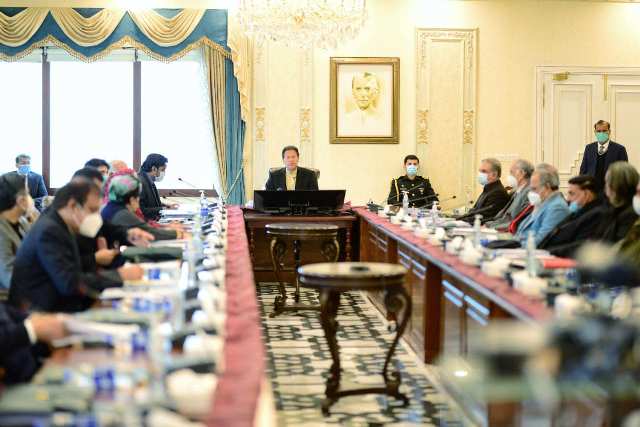 Prime Minister Imran Khan hosts a meeting in January 2021. [photo: Prime Minister's Facebook page]
Prime Minister Imran Khan hosts a meeting in January 2021. [photo: Prime Minister's Facebook page]
[These two excerpts are from a research article in The Round Table: The Commonwealth Journal of International Affairs.]
Options at Pakistan’s disposal
Pakistan has tried to internationalise the Kashmir issue on different platforms (the UN, the OIC, the US, and China) but with little success, leaving Prime Minister Khan himself to ask: ‘Will these big countries keep looking at their markets only?’. Khan warned that the inaction of the international bodies has put world peace in danger, as ‘both countries have nuclear weapons’. It would appear that Pakistan may be in a conundrum after not getting sufficient support from the above-noted actions following the revocation of Article 370. Pakistan appears at a crossroads as to whether to provide only symbolic support to Kashmiris and then over time settle on a compromise on the new status of Kashmir, or to take tangible steps, irrespective of the cost and consequences. Understandably, Khan is overwhelmed and so far he has given mixed signals. As noted earlier, in the Pakistani parliament he asked: ‘What do you want me to do?’, ‘Should I go to war with India?’ Within two weeks, he stated: ‘Whether the world joins us or not, Pakistan will go to any lengths and its people will support [Kashmiris] till their last breath’. Within three weeks of the revocation, he pledged that ‘Pakistan won’t initiate military conflict with India, warning of the risk to the world of nuclear war’, but its Ministry of Foreign Affairs later clarified that ‘there was no change to Pakistan’s nuclear defensive posture’. These are delicate times for Pakistan, considering its slowing economy, a minority government, and the FATF noose hanging around its neck. From a strategic perspective, Pakistan may see itself as having at least six options at its disposal to contemplate in the current context but it must consider the morality and practical consequences of each, otherwise it may suffer perilous isolation in international affairs. We outline these six options below.
Click here to read this article in full.
Conclusion
Over the last seven decades, in its efforts to liberate Kashmir from India, Pakistan seems to have lost economic and political vibrancy on the home front. In paying with its blood and treasure over the decades, it has been pushed to a serious economic crisis, placed on the FATF Grey List, and discredited in the Western world for harbouring and sponsoring terrorism. It has been ostracised and seems obliged to place all its eggs in China’s basket. But China too has its own economic, security and strategic interests, and as such cannot afford to neglect a rising power like India. This is a practical aspect of strategic-political alignment and posturing. Similarly, President Trump during his February 2020 visit to India did not make any reference to Kashmir but, instead, put the onus on Pakistan to stop terrorism emanating from its soil. In the recently concluded US-Taliban peace deal, the US even included a specific caveat that ‘Afghan soil will not be used against the security of the United States and its allies’, which implicitly includes India. Furthermore, getting support from only two countries, Malaysia and Turkey, at the UN reflects an unfavourable situation for Pakistan. It hardly needs to be said that Pakistan may find reasons to seriously revisit its current Kashmir policy.
Prime Minister Khan is unarguably a dynamic and forward-looking leader, one who appears to enjoy the confidence of his country’s military. His vision for a ‘New Pakistan’ may well have encompassed sorting out the J&K issue with India in the interest of building relations that are more amicable. The move by the Modi government to revoke Article 370 may have perhaps embarrassed any attempt or strategy he had in mind to resolve that matter and thus placed him on the offensive to show and vent a position that may resonate with the Pakistani populace. If so, that is an understandable situation in which to be. Nevertheless, it may inadvertently provide the opportunity to advance his long-term vision to his people to build a ‘naya’ (new) Pakistan. Pakistan is currently marginalised and stigmatised in international settings and is perceived by many in the community of nations in unenviable ways. A ‘New Pakistan’ that liberates itself from the ‘sponsor of terrorism’ image-bondage may generate greater appeal in international fora.
Dalbir Ahlawat is a Senior Lecturer, Department of Security Studies and Criminology, Macquarie University , Sydney, Australia and M. Raymond Izarali is Associate Professor, Department of Criminology, Wilfrid Laurier University (Brantford Campus), Brantford, Canada.



